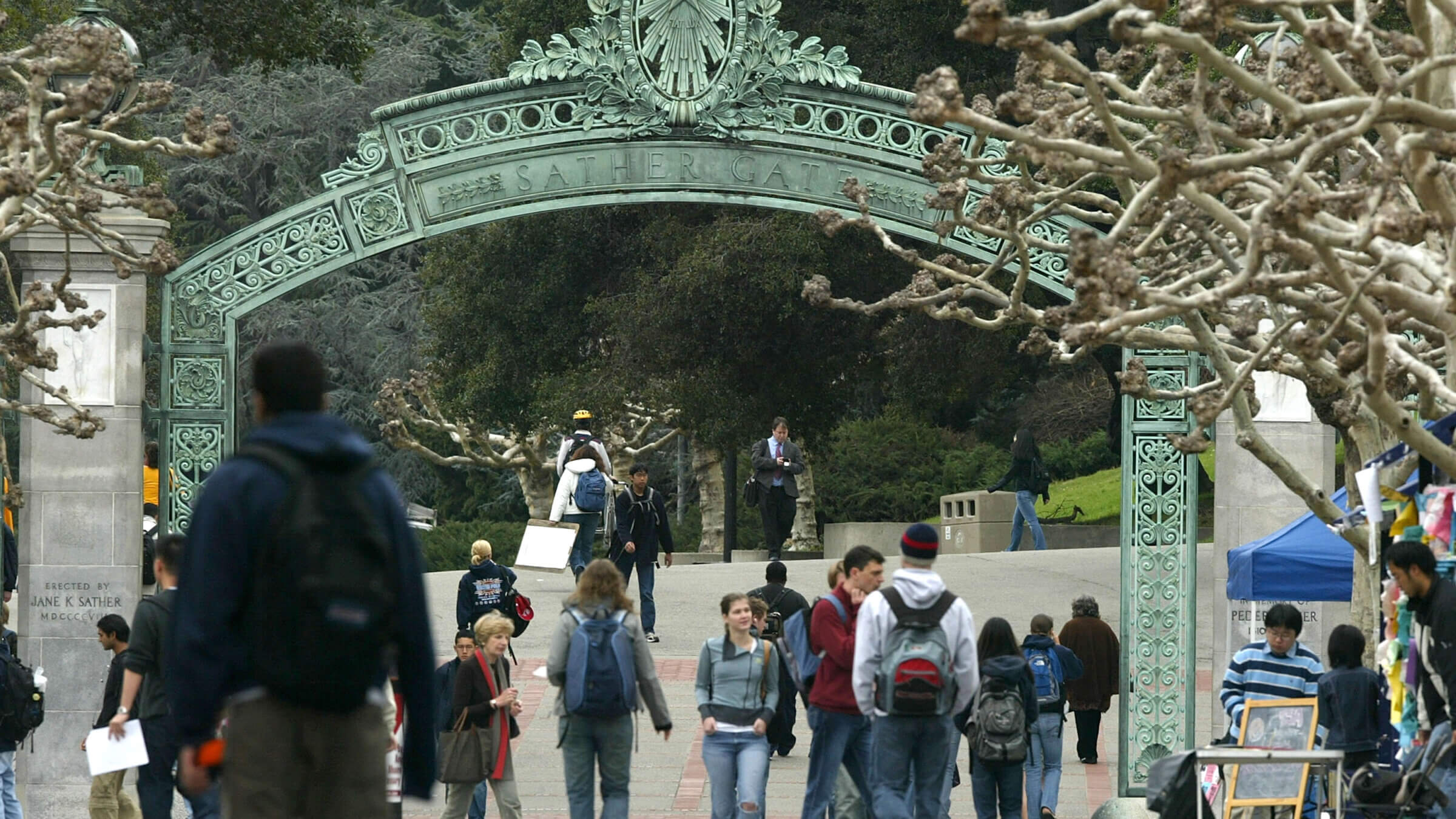‘Schools are not doing enough’: California proposal would ban calling for genocide on campus
The bill is part of a raft of state legislation targeting a rise in antisemitism

Students walk near Sather Gate on the University of California, Berkeley campus. Photo by Justin Sullivan/Getty Images
A new bill in California would require public colleges and universities to ban students and employees from calling for genocide while on campus. It is part of a wave of proposed legislation aimed at combating antisemitism in the state.
The California Senate bill follows a December federal congressional hearing in which university presidents from Harvard, University of Pennsylvania and MIT appeared to waver when asked whether calling for the genocide of Jewish people would violate their codes of conduct.
The bill also mandates schools ban any harassment, intimidation, discrimination or violence that would interfere with students’ free exercise of First Amendment rights.
“Even in these difficult circumstances, all students should be able to freely express themselves without threat or intimidation on college campuses,” said State Sen. Steve Glazer, who sponsored the bill. “Unfortunately, there have been some events to the contrary.”
The bill, SB 1287, does not stipulate what would constitute a call for genocide, leaving open whether controversial slogans such as “From the river to the sea, Palestine will be free” would be included. (Some interpret the phrase as a call for the genocide of Israeli Jews, although its meaning is debated.) The bill requires that school policies ban forms of harassment that “are intended to [be], and are reasonably understood by the victims or hearers” as, calls for genocide.
In its current form, the bill would leave the determination of what language might qualify to school administrations in the state’s University of California, California State University and community college systems.
Glazer said the language of the bill was “carefully crafted to be responsive to the circumstances which we find ourselves in.”
David Bocarsly, executive director of Jewish Public Affairs Committee of California, which is supporting the bill, said the bill wasn’t intended to prescribe specific punishments for specific phrases.
But it is unclear whether any UC students have called overtly for genocide of Jewish people.
Bocarsly declined to say whether he thought a “From the river to the sea” chant would count as a call for genocide. Some Jewish groups say that it is a call to eliminate Israel and the millions of Jews who call it home. Defenders of the phrase say it is an aspirational call for human rights.
“What’s really clear is that schools are not doing enough,” Bocarsly said. The bill, he said, would “give school leaders a roadmap for which to be able to effectively protect their Jewish students.”
After the Dec. 5 congressional hearing, which focused on rising campus antisemitism after Oct. 7, many Jewish groups were particularly critical of then-Penn President Elizabeth Magill, who said the permissability of calls for genocide against Jews depended on context, and resigned four days after the hearing. (Harvard President Claudine Gay resigned in January amid accusations of plagiarism.)
“We want to make sure that when university presidents and chancellors in California are asked that question,” about whether calls for genocide on campus are verboten, “that they can explicitly say yes,” Bocarsly said.
California’s public universities have made regular news for campus antisemitism since the onset of the Israel-Hamas war.
The University of California, Berkeley — where an event featuring an Israeli speaker was canceled in February after pro-Palestinian protesters broke down doors — is being investigated by a Republican-led congressional committee, which says the school has allowed antisemitism to fester. UCLA, UC San Diego and UC Santa Barbara are all separately facing Title VI investigations related to antisemitism, as are San Diego State University and Santa Monica College.
State Sen. Scott Wiener, a Democrat, said in a recent public meeting that Jewish students in California had described to him feeling unsafe wearing a Star of David or a kippah on campus.
He noted incidents at UC Davis, where a faculty member posted a threat against “Zionists journalists” on social media, and at UC San Francisco, where a medical school professor said that “the presence of Zionism in US medicine” was “a structural impediment to health equity.”
“We have seen the use of the word ‘Zionist’ as a substitute for the word ‘Jew,’” Wiener said. “‘Zionist’ means someone who believes in Israel’s existence as a Jewish homeland. That describes 90% of Jews. So when people use the word ‘Zionist,’ you have to ask what that means.”
In response to concerns of faculty spurring campus antisemitism, the University of California Board of Regents, which oversees the UC system, has proposed a measure that would limit anti-Zionist expression on academic department homepages.
If passed, the bill would affect more than 2.6 million students currently enrolled in California’s public colleges and universities. It would become effective Jan. 1, 2025.
Among the other pieces of proposed antisemitism-focused legislation are a bill that would require antisemitism to be included as a subject in higher education diversity, equity and inclusion training and a bill that would make distributing hate flyers punishable by fines of up to $25,000.






















